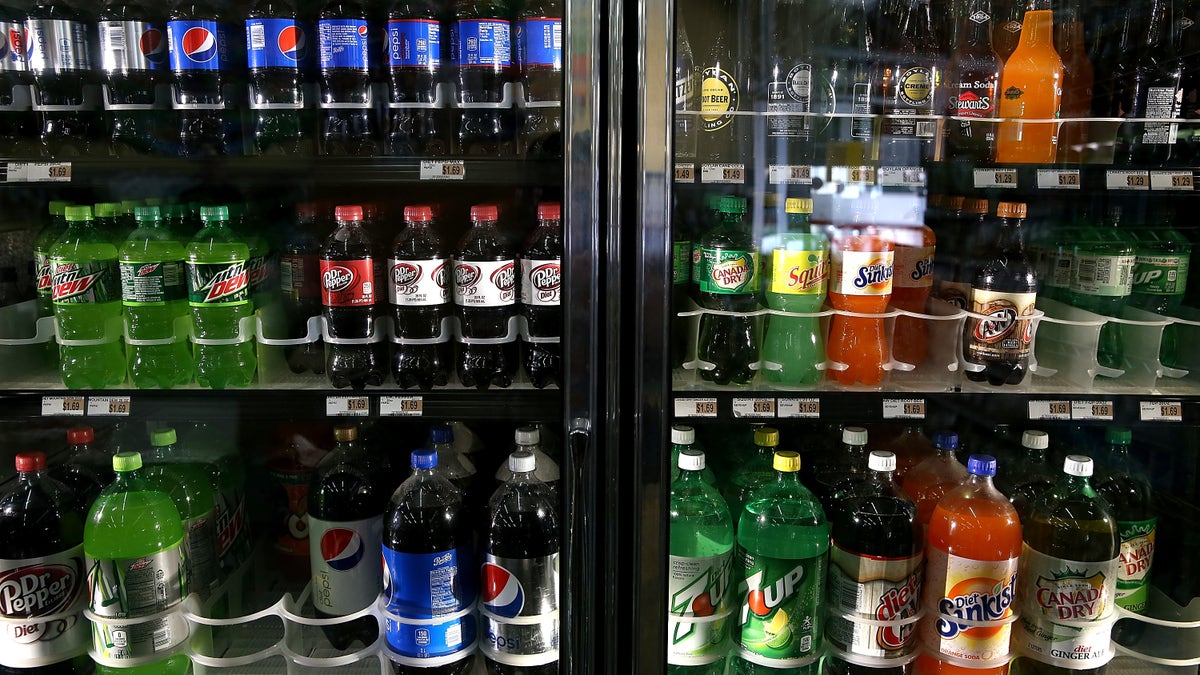
SAN FRANCISCO, CA - JULY 22: Various bottles of soda are displayed in a cooler at Marina Supermarket on July 22, 2014 in San Francisco, California. The San Francisco Board of Supervisors will vote on Tuesday to place a measure on the November ballot for a 2-cents-per-ounce soda tax. If the measure passes in the November election, tax proceeds would help finance nutrition, health, disease prevention and recreation programs. (Photo by Justin Sullivan/Getty Images) (2014 Getty Images)
Today, nearly 70 percent of American adults are either overweight or obese. For decades, Washington has been focusing on fighting the obesity epidemic without properly picking the right battles.
In recent years, the food industry has been able to insert over 10 different types of added sugars into our nutrition labels, leaving Americans confused about how much sugar we are actually putting into our bodies.
If for every Pepsi commercial with Beyoncé there was a counter commercial with a famous celebrity advertising organic foods and the need to eat more fruits and vegetables, we would be well on our way to ending the obesity epidemic, along with countless other diseases.
In the American Diet, added sugar alone accounts for nearly 500 calories every day. Further, in any given week, the average American consumes 3 pounds of sugar each week or 3,550 pounds in an entire lifetime. That's enough sugar to fill an industrialized dumpster!
Consuming high doses of added sugar isn't only making us fatter; it's also making us sicker. By consuming high percentages of sugar, Americans are increasing their chances of contracting major diseases such as diabetes or cardiovascular disease.
If you take a close look at any nutrition label in America, you will notice that all of the major nutrition components, including fat, saturated fat, trans fat, cholesterol, sodium, potassium, and total carbohydrates, all display the recommended percentage of the daily value of the standard American diet.
Yet, next to the word "sugar" on any standard American nutrition label, there is no indication of the recommended percentage of the daily value that you should be consuming in any given food or beverage item.
How are we supposed to know if we are consuming the right amounts of sugar if we don't have the basic tools and information necessary to do so?
For years, both the sugar and food industry have been able to successfully lobby Washington so Americans continue to be blinded in regards to how much sugar they should actually consuming each day.
According to The American Heart Association, the recommended daily sugar consumption for men is 37.5 grams, while woman should consume no more than 25 grams of sugar on a daily basis.
Currently, people in the United States are consuming an average sugar intake of 76.7 grams per day, which equals to 19 teaspoons of sugar. That's more than double the recommended consumption in a single day.
For years, institutions like Coca-Cola, Nestle, and McDonalds have been focusing on the importance of exercising and the need for Americans to simply eat less.
Although exercising promotes weight loss and provides a variety of health benefits, simply eating less and burning more calories doesn't work. The math simply does not add up.
For example, on average, a 20-ounce bottle of soda contains 250 calories and 16 tablespoons of sugar, which would require 50 minutes of running or 5 miles of walking to burn off. And that's just one soda. Imagine how much time we would need to take out of our day to burn off that cookie, ice cream, and highly sugary drinks such as orange and cranberry juice.
Truth be told, the average American does not have the time in a given day to burn off all of the added sugar one consumes on a daily basis.
The only way Americans will truly begin to shift their mindset and consume foods that contain less sugar is if the government takes the proper steps to ensure that they are properly informed in an honest and fair way.
In February of this year, the U.S. Dietary Guidelines Advisory Committee issued a set of recommendations abandoning a sole focus on the consumption of fat and cholesterol and instead focusing a large amount of their energy on the overconsumption of added sugar and refined grains as major health hazards.
This is certainly a step in the right direction and something that has taken years to gain the political strength to get done. But if we truly want to win the War on Sugar, much more needs to be done.
Yes, parents need to be aware of what their children are eating, and yes, we all need to exercise and be more active. But the biggest culprit in all of this is the thousands of advertisements and deceitful tactics the food industry is constantly using in order to misguide us on how much sugar we should be consuming on a daily basis.
If every candy bar and soda across the country carried a warning label just like a pack of cigarettes does, then our country would start to see our sugar consumption go down, just as we have been able to see it happen within the Tobacco industry.
If for every Pepsi commercial with Beyoncé there was a counter commercial with a famous celebrity advertising organic foods and the need to eat more fruits and vegetables, we would be well on our way to ending the obesity epidemic, along with countless other diseases.
If we are serious about battling the obesity epidemic, if we are serious about lowering the millions of deaths related to heart disease each year, then we need to have meaningful conversations in kitchen tables across the country.
Only then, we will be able to unite our voices and pressure our government to help us reduce the amount of sugar we consume each day, one grain at a time.
